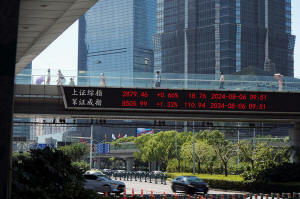|
According to LSEG data, foreigners sold a net $3.8 billion worth
of regional shares in South Korea, India, Taiwan, Indonesia,
Vietnam, Thailand, and the Philippines last month, after two
months of net purchases in a row.
"The month (August) has seen the outperforming tech sector
trailing behind the rest in terms of performance, seemingly with
some rotation in place towards the laggards as market
participants digest lofty tech valuation and look towards
upcoming Fedís rate easing," Yeap Jun Rong, a market strategist
at IG, said.
Taiwanese and South Korean equities, which include many
companies that manufacture chips for AI applications,
experienced outflows of $4.2 billion and $2.1 billion
respectively in the last month.
Jason Lui, head of APAC equity and derivative strategy at BNP
Paribas, attributed the foreign outflows in Taiwan and Korea to
a reassessment of sentiment on semiconductors and AI.
"Global investors are starting to question the profitability and
sustainability of large capital spending by leading tech
companies in the U.S.," he said.
Indian markets managed a net inflow of $873 million. Most of the
buying was driven by new issues in the primary market, however,
and foreigners sold stocks traded on exchanges worth a net $662
million worth.
"Foreigners have been reducing exposure to India because they
feel itís expensive," said Herald van der Linde, head of equity
strategy, Asia Pacific at HSBC.
Indian stocks trade at a 12-month price-to-earnings ratio of
about 24.06, the highest among major global markets, as per LSEG
data.
Foreigners, meanwhile, pulled out of Vietnam stocks for a
seventh month running, with about $151 million in net sales last
month. They also shed Thai equities of $175 million.
Bucking the trend, Indonesian and Philippine equities attracted
about $1.85 billion and $144 million worth of foreign inflows
respectively last month.
(Reporting by Gaurav Dogra and Patturaja Murugaboopathy in
Bengaluru; editing by Barbara Lewis)
[© 2024 Thomson Reuters. All rights
reserved.]
This material may not be published,
broadcast, rewritten or redistributed.
Thompson Reuters is solely responsible for this content.

|
|




